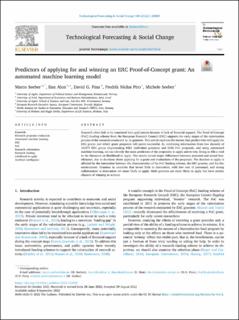Predictors of applying for and winning an ERC Proof-of-Concept grant: An automated machine learning model
Peer reviewed, Journal article
Published version
Permanent lenke
https://hdl.handle.net/11250/3030173Utgivelsesdato
2022Metadata
Vis full innførselSamlinger
Originalversjon
Technological Forecasting and Social Change. 2022, 184 1-16. 10.1016/j.techfore.2022.122009Sammendrag
Research often fails to be translated into applications because of lack of financial support. The Proof of Concept (PoC) funding scheme from the European Research Council (ERC) supports the early stages of the valorization process of the research conducted by its grantees. This article explores the factors that predict who will apply for ERC grants and which grant proposals will prove successful. By combining information from two datasets of 10,074 ERC grants (representing 8361 individual grantees) and 2186 PoC proposals, and using automated machine learning, we can identify the main predictors of the propensity to apply and to win. Doing so fills a void in the literature on likelihood to apply. The results reveal major differences between potential and actual beneficiaries, due to decisions about applying for a grant and evaluations of the proposals. The decision to apply is affected by the interaction between the characteristics of the PoC funding scheme, the ERC grantee, and his/her environment. Grantees in countries that invest little in innovation, with low cost of personnel, and strong collaboration in innovation are more likely to apply. Male grantees are more likely to apply but have similar chances of winning as women.
